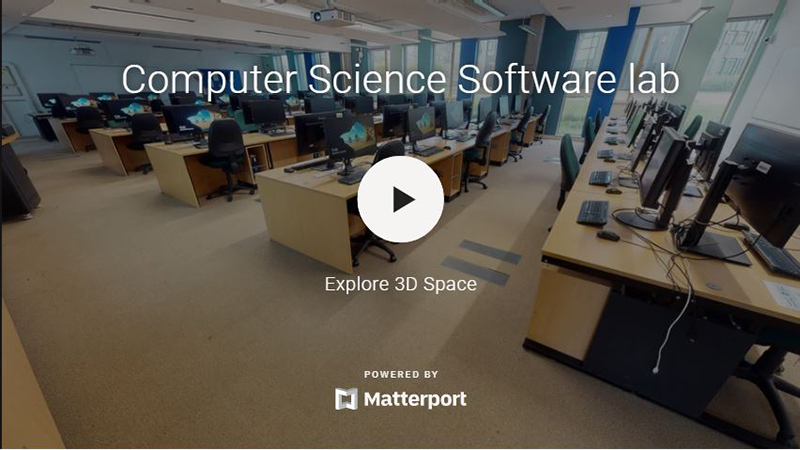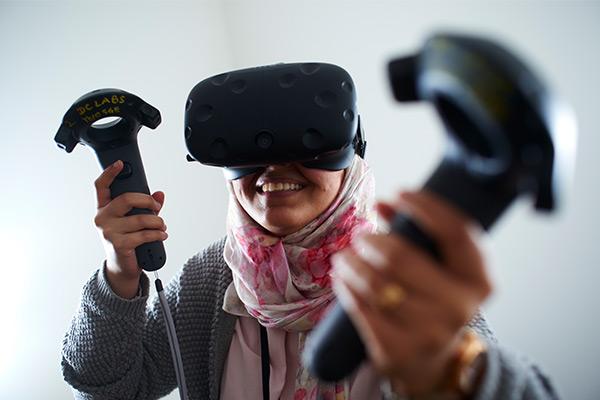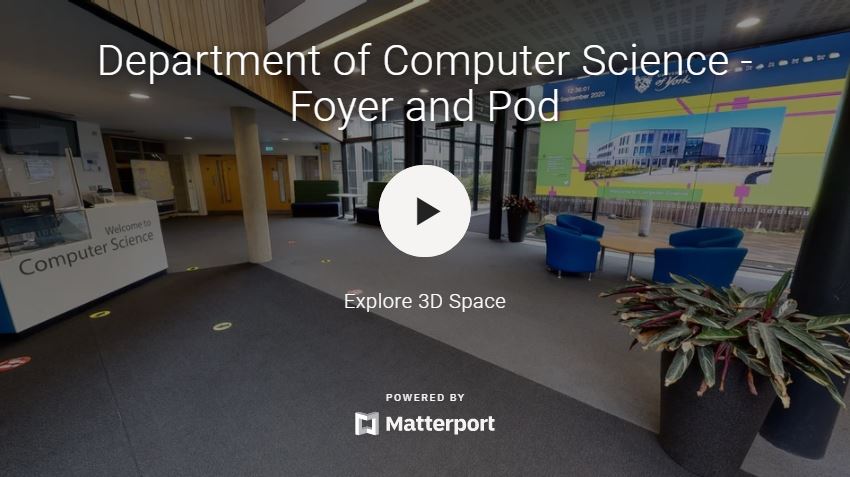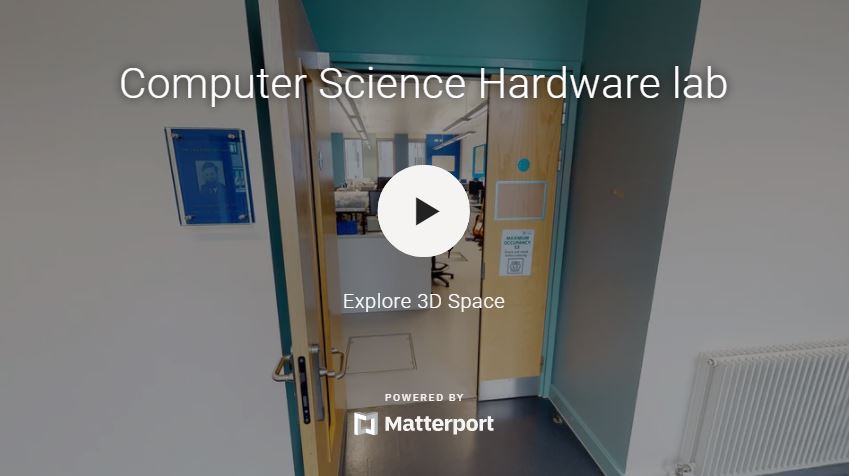View semester dates

BSc (Hons) Data Science (with a year in industry)
Solve the challenges facing our data-driven world.
Year of entry: 2026/27
View semester dates
This course aims to produce multi-skilled, highly competent graduates who are equipped to make significant contributions to their career field and who understand the implications of their work, both for themselves and for society as a whole.
The course has three integrated strands which develop mathematical foundations, computational thinking, and engineering skills. It's the combination of these three areas that make graduates attractive to employers, enabling an immediate contribution when moving into employment.
You'll be provided with a solid foundation in the principles and practices of data science, including relevant computer science components such as coding and machine learning, and mathematical areas such as probability, statistics and calculus. Key aspects of modern data science are covered, from the theoretical building blocks of linear algebra and algorithmics, to real-world implementations and discussion of the wider impacts that data science has on society.
You'll develop the technical skills needed to critically analyse, mine, and manage different kinds of data in order to learn and discover interesting patterns. You'll learn how to make actionable conclusions from those assessments, while participating effectively in multidisciplinary teams. Study culminates in a focused research project in the field of data science which develops the skills to contribute professionally to solving complex commercial and industrial engineering problems.
This course is also available without a year in industry. See BSc Data Science.
Our software labs offer spaces for individual and group work. Software lab virtual tour
Course content
All students will study our core topics in computer science, which we have designed to be consistent with the Association for Computing Machinery (ACM) curriculum guidelines. These core topics provide the fundamental knowledge that all computer science graduates should possess, and the foundation to study more flexibly in the third year.
Year 1
Core modules
- Software 1: Foundations of Programming for Computer Science
- Introduction to Probability and Statistics
- Foundations and Calculus
- Software 2: Object Oriented Data Structures and Algorithms
- DATA: Introduction to Data Science
- Multivariable Calculus and Matrices
Academic integrity module
In addition to the above you will also need to complete our online Academic Integrity module.
Year 2
Core modules
Year 3
You will spend this year out in industry if you successfully obtain a placement. You will be supported in achieving this by our dedicated Industrial Placements Team, who is there to help you with your CV, give you interview tips, arrange interviews on campus, and will keep in touch with you while you are on your placement to ensure everything is going well. We have excellent relationships with a strong portfolio of companies from large multinationals such as IBM and Airbus UK, to smaller companies such as YorkTest and Informed Solutions.
Your year in industry gives you a chance to use what you have learned during your degree. As well as being paid a good salary, students who take a year in industry generally achieve better grades, develop a broader range of skills and are more attractive to future employers. Some students even find a job with their placement company before they graduate.
Find out more about a year in industry.
Before starting a placement that forms part of your course, you are likely to be asked by the placement provider to sign a confidentiality agreement. This is to ensure that you do not disclose any information that is confidential to the placement provider.
Year 4
Core modules
- Computer Science project or Mathematics project
- Governance in Data Science
- Cloud-Based Data Analysis
Option modules
You will study two option modules. Examples can be found below. Some option module combinations may not be possible. The options available to you will be confirmed after you begin your course.
- AI Search and Logic
- Autonomous Robots
- Computer Vision and Graphics
- Cryptography Theory and Practice or Cryptography
- Engineering 2: Automated Software Engineering
- Deep Learning
- Interaction Design and Evaluation
- Qualitative Approaches to Investigating UX
- Quantum Computation
- Decision Theory and Bayesian Statistics
- Survival Analysis and Generalised Linear Models
- Mathematical Finance in Continuous Time
- Mathematical Finance in Discrete Time
- Advanced Regression and Multivariate Analysis
- Numerical Analysis
- Operations Research
- Statistical Data Science
- Time Series
Elective modules
You may be able to replace one option module with an elective module, studying a complementary subject, a language or an interdisciplinary topic.
Our modules may change to reflect the latest academic thinking and expertise of our staff, and in line with Department/School academic planning.
Learning outcomes
Every course at York has been designed to provide clear and ambitious learning outcomes. These learning outcomes give you an understanding of what you will be able to do at the end of the course. We develop each course by designing modules that grow your abilities towards the learning outcomes and help you to explain what you can offer to employers. Find out more about our approach to teaching and learning.
Learning outcomes for this course
- Apply computational, mathematical and statistical theory to solve data science problems, using skills in problem analysis, representation, abstraction, programming and software engineering.
- Critically analyse statements, arguments or conjectures that underpin the theory of mathematics, statistics and computer science and justify the principles chosen for such critiques.
- Develop computational and mathematical techniques for critical analysis, mining, and management of data to learn and discover meaningful patterns and knowledge beneficial for real world applications.
- Communicate complex ideas in computational and mathematical data science and the discovered knowledge in a clear and organised manner, at a level appropriate for the intended recipients and present an effective summary of these ideas.
- Adapt to new and unfamiliar challenges in computational and mathematical data science, recognising appropriate ideas and approaches drawn from a range of technologies, languages, paradigms, models and mathematical theories.
- Apply computational and mathematical data science skills to practical problems and real-world datasets collected in collaboration with industrial partners, in a safe, ethical, and secure way.
Fees and funding
The fees and funding information here is for students starting in the 2026/27 academic year.
If you take a year abroad or year in industry you'll pay a reduced rate of fees for that year.
Annual tuition fees
| UK (home) | International and EU |
|---|---|
| £9,535 (TBC) | £32,350 |
The UK government has announced its intention to increase tuition fees from £9,535 to £9,790 for the 2026/27 academic year. We expect this to apply to new UK (home) undergraduate students starting their studies in September 2026.
UK (home) or international fees?
The level of fee that you will be asked to pay depends on whether you're classed as a UK (home) or international student. Check your fee status.
Fees for subsequent years
- UK (home) fees may increase within the government fee cap in subsequent academic years. We will notify you of any increase as soon as we can.
- International fees are subject to increase in subsequent years in line with the prevailing Consumer Price Index (CPI) inflation rate (up to a maximum of 10%).
More information
For more information about tuition fees, any reduced fees for study abroad and work placement years, scholarships, tuition fee loans, maintenance loans and living costs see undergraduate fees and funding.
Additional costs
There are unlikely to be any mandatory additional costs associated with the course, although you may want to set aside £200 for optional photocopying and personal stationery over the duration of the course.
Funding
We'll confirm more funding opportunities for students joining us in 2026/27 throughout the year.
- UK government loans
- UK scholarships and bursaries
- International scholarships
- Country-specific funding
- US loans
See Undergraduate scholarships for current information about funding opportunities for Computer Science students.
York, Oxford, Cambridge, Imperial
Just four UK universities are rated Gold for teaching and top ten for research* in the latest national assessment exercises.
* Awarded joint 10th in the Times Higher Education ranking of the Research Excellence Framework 2021.
Teaching and assessment
You’ll study and learn with academics who are active researchers, experts in their field and have a passion for their subjects. Our approach to teaching will provide you with the knowledge, opportunities, and support you need to grow and succeed in a global workplace. Find out more about our approach to teaching and learning.
Teaching format
A typical week will involve about 10-15 hours of scheduled teaching time. Our courses are based on a series of lectures with associated laboratory sessions, programming classes and tutorials.
Throughout the course, you will have a personal supervisor responsible for guiding your studies. In addition to any timetabled sessions, you will meet with your supervisor regularly, and you can also go to them at any time should you have any issues, academic or personal. There are problem classes to help you put learning from lectures into practice and regular project supervision meetings for your individual project.
You will also undertake learning outside of the scheduled timetable. This can be through working in the labs, through reading recommended materials or by working through problems. Consequently, you'll need to be self-motivated, self-disciplined and willing to learn outside regular classes.
As you progress through the course you will develop your skills to become a more independent learner. You'll also spend time working on your individual research project later on in the course, in addition to timetabled activity.
In the UK, full-time students are expected to spend 1,200 hours a year learning. That's about 40 hours of classes and independent study each week during semesters. Everyone learns at a different rate, so the number of hours you spend on independent study will be different to other students on your course.
Facilities
The Department of Computer Science and the Department of Mathematics are both housed in the Ian Wand Building on Campus East. Built to the highest specifications, the Ian Wand Building is packed with cutting-edge facilities housed in a modern, self-contained building.
The Department of Computer Science houses four software and two hardware laboratories which you will be able to use depending on the topic of your third year project. These facilities are professional grade and used by our research teams so, depending on your interests, you'll get first hand exposure to these environments.
The Department of Mathematics is a community of mathematicians from all over the world, engaged in world-class research and committed to excellence in teaching with a special emphasis on small groups and a friendly atmosphere.
Teaching location
The Department of Computer Science and the Department of Mathematics are both based on Campus East in the Ian Wand Building. You will be taught at a range of locations across Campus East and Campus West.
About our campus
Our beautiful green campus offers a student-friendly setting in which to live and study, within easy reach of the action in the city centre. It's easy to get around - everything is within walking or pedalling distance, or you can use the fast and frequent bus service. Take a campus tour.
Assessment and feedback
We use a variety of assessment techniques throughout your course. This allows you to practice different techniques, from report writing, presentations and live demos to timed programming assessments and closed exams. It also means that you are not disadvantaged by being assessed in any one way.
To aid your learning we provide feedback on your assessments in addition to the marks you receive. Our Departmental Examinations Team is also available should you have any assessment queries.
We also ask our students for feedback on the course at the end of each year. This helps to improve and modify what we do to help meet the needs of our students.
Careers and skills
The move towards a digital economy creates demand for computer scientists and software engineers across a broad section of employers, so the skills you develop here will make you attractive to many organisations. Most of our graduates go into the field of IT/computing, followed by financial services, some undertake further study (eg PhD) and others go straight into industry (for example working for IBM, BAE Systems).
Many of our graduates are employed by software and electronics industries, but the continuing expansion of the use of computers in commercial and financial operations means that you will be able to find employment in other industries - and here your sharpened numeracy and analytical skills will have prepared you well.
Read some profiles of our past students and find out how their degree from York helps them to do jobs in organisations as diverse as Mars Inc and Cancer Research UK. Other companies that York graduates have gone on to work for include Amazon, BAE Systems, Morgan Stanley, G Research, Thales, the Civil Service, M&G Investments, Ubisoft, Rapita Systems, Sky, BT, Raspberry Pi, IBM, JP Morgan, Hut Group and Automaton Games.
Career opportunities
- Computer programmer
- Software engineer
- Software developer
- Business analyst
- Research scientist
- Network manager
- IT Systems manager
Transferable skills
At York, you will gain a broad understanding of all of the essential scientific principles, engineering techniques and practices in computer science. This allows you to be flexible and adapt quickly in any field that you wish to go into. More specifically, we can identify four main skill areas:
- analytical skills
- research skills
- management skills
- communication skills
Entry requirements
| Qualification | Typical offer |
|---|---|
| A levels | AAA including Mathematics. If you are studying towards a fourth A level, we will make an alternative offer of AABB including grade A in Mathematics. |
| Access to Higher Education Diploma | We accept the Access to Higher Education Diploma. The syllabus must contain a significant portion of Mathematics that is considered equivalent to A level standard. Applications will be considered on an individual basis - please contact the Department before you apply. |
| BTEC National Extended Diploma | DDD and grade A in A level Mathematics (or equivalent qualification). We consider applicants with a combination of other BTEC Level 3 qualifications, and this must include grade A in A level Mathematics (or equivalent qualification). Please contact us to discuss your combination of qualifications |
| European Baccalaureate | 85% overall, including 85% in Mathematics |
| International Baccalaureate | 36 points overall, including grade 6 in Higher Level Mathematics (either Analysis and Approaches or Applications and Interpretations). |
| T levels | We are currently not accepting T Levels for this course unless an additional A Level (or equivalent qualification) in Mathematics has been taken. |
| Scottish Highers / Advanced Highers | Advanced Highers - A in Mathematics plus Scottish Highers - BBBB We may also be able to consider three Advanced Highers or a combination of Highers and Advanced Highers, where an applicant does not meet the grade requirement through Highers alone. Please contact us to discuss your qualifications. |
| International foundation programme | Foundation Certificate from our International Pathway College or an appropriate alternative. |
| Other qualifications | We welcome applications offering a mix of OU, A level and other appropriate qualifications. Applications will be considered on an individual basis: please contact the Department before you apply. |
| Other international qualifications | Equivalent qualifications from your country |
Alternative offers
Meeting the following additional criteria may qualify you for an alternative offer.
| Criteria | Adjustment |
|---|---|
| Widening participation | ABB including A in Mathematics This is conditional upon successful completion of the WP programme including the YorJourney module (Black Access Programme, Next Step York) or successful completion of Realising Opportunities More about widening participation. |
| Contextual offer | AAB including grade A in Mathematics. |
| EPQ | If you achieve A or higher in the EPQ, you may be eligible for an alternative offer up to one A level grade (or equivalent) below our typical offer. |
English language
If English isn't your first language you may need to provide evidence of your English language ability. We accept the following qualifications:
| Qualification | Minimum requirement |
|---|---|
| IELTS (Academic) | 6.5, with a minimum of 6.0 in each component |
| IB English | A score of 4 in English A or 5 in English B (Higher Level or Standard Level) |
| Cambridge CEFR | 176, with a minimum of 169 in each component |
| Oxford ELLT | 7, with a minimum of 6 in each component |
| Oxford Test of English Advanced | 136, with a minimum of 126 in each component |
| Duolingo | Integrated subscores: 120 overall, with a minimum of 105 in each component |
| GCSE/IGCSE/O level English Language (as a first or second language) | Grade C / Grade 4 |
| LanguageCert SELT | B2 with a minimum score of 33/50 in each component |
| LanguageCert Academic | B2 with a minimum score of 33/50 in each component |
| Kaplan Test of English Language | 478 Main Flight score with 444 in each component |
| Skills for English | B2: Merit overall, with Pass with Merit in each component |
| PTE Academic | 61, with a minimum of 55 in each component |
| TOEFL | 87 overall, with a minimum of 21 in each component (taken before January 2026) 4.5 with 5 in Listening and 4.5 in each other component (taken after January 2026) |
| Trinity ISE III | Merit in all components |
| Other English language qualifications | We also accept other English Language qualifications, including various school-leaving certificates. |
For more information see our undergraduate English language requirements.
If you haven't met our English language requirements
You may be eligible for one of our pre-sessional English language courses. These courses will provide you with the level of English needed to meet the conditions of your offer.
The length of course you need to take depends on your current English language test scores and how much you need to improve to reach our English language requirements.
After you've accepted your offer to study at York, we'll confirm which pre-sessional course you should apply to via You@York.
Next steps
Contact us
Get in touch if you have any questions
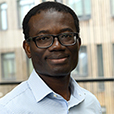
Discover York





